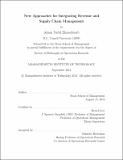New approaches for integrating revenue and supply chain management
Author(s)
Elmachtoub, Adam Nabil
DownloadFull printable version (1.804Mb)
Other Contributors
Massachusetts Institute of Technology. Operations Research Center.
Advisor
Retsef Levi.
Terms of use
Metadata
Show full item recordAbstract
First, we describe a general framework called online customer selection that describes natural settings where suppliers must actively select which customer requests to serve. Unlike traditional revenue management models that have sunk costs, we assume there are supply chain costs that depend on the demand being served. Specifically, customers arrive in an online manner, each with a set of requirements and associated revenue, and are either accepted or rejected upon arrival. Rejected customers incur a lost-sales cost, while accepted customers are satisfied with minimum possible production cost. The goal of the supplier is to minimize the total cost of lost sales and production. We provide algorithms with strong performance guarantees that are based on new variants of repeated optimization as well as concepts from mechanism design. Second, we study the use of opaque products in a retail setting. A product is said to be opaque when one or more of its attributes are hidden until the transaction is complete. Opaque products have been used in the hotel and airline industry where customers purchase rooms or airfare without a priori knowledge of the brand name. In this work, we propose the use of opaque product selling in the retail industry, where there are nonperishable goods and supply chain costs. We show that a small amount of opaque selling can achieve significant ordering and holding costs savings for the supply chain. Moreover, we describe settings when a stationary opaque selling strategy can outperform a common dynamic pricing strategy. Third, we focus on a variant of the joint replenishment problem, which arises in the previous two parts as well as in inventory management, logistics, and maintenance scheduling. In this problem, there are multiple item types that each has a given time-dependent sequence of demands that need to satisfied. Every time an order of item types is placed, there is an associated fixed setup cost that is submodular in the subset of item types ordered. The overall goal is to minimize the total fixed ordering costs plus inventory holding costs. We provide a variety of approximation algorithms for this problem and some special cases.
Description
Thesis: Ph. D., Massachusetts Institute of Technology, Sloan School of Management, Operations Research Center, 2014. This electronic version was submitted by the student author. The certified thesis is available in the Institute Archives and Special Collections. Cataloged from PDF student-submitted version of thesis. Includes bibliographical references (pages 165-172).
Date issued
2014Department
Massachusetts Institute of Technology. Operations Research Center; Sloan School of ManagementPublisher
Massachusetts Institute of Technology
Keywords
Operations Research Center.